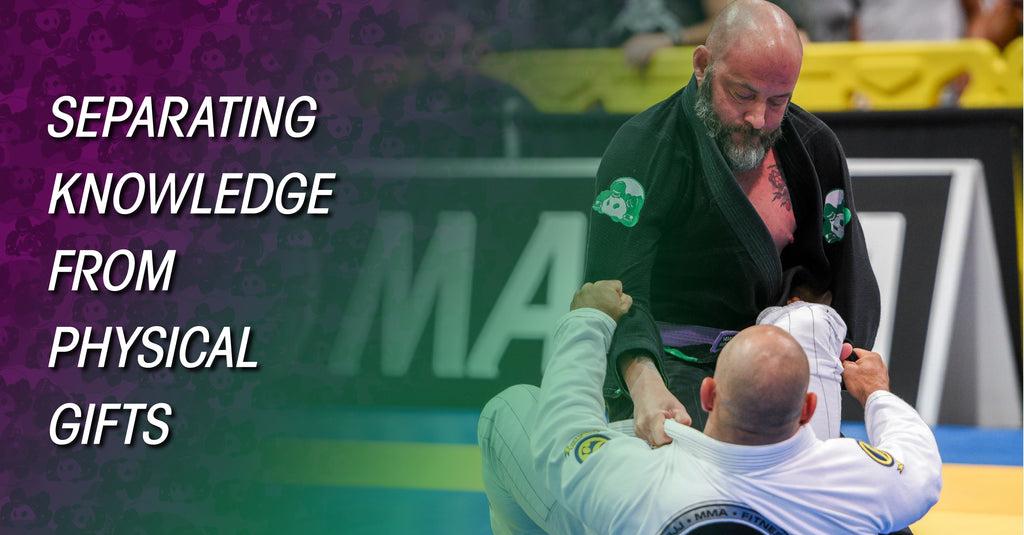Separating Knowledge from Physical Gifts

A meniscus (cartilage in the knee) repair, partial removal, or total removal may increase one’s risk of osteoarthritis and therefore likelihood of needing a total knee replacement.
The number of patient who will experience permanent, chronic pain after a hernia repair (using medical mesh) is at least 4% by the most conservative estimates and as high as 45% according to some studies.
These are my two largest health issues, one hernia repair and four meniscus surgeries later. In addition to the standard assortment of jiu-jiteiro nagging injuries—turf toe, occasional rib issues, sore knuckles, and a strained lower back—my health plays a huge factor in how I train. At 30-years-old, I am young by most standards, but I was not gifted with durability. More than 10 years in the sport have aged me quickly, and I can’t let go of training.
I’ve come to term with this, and I’ve accepted that I won’t ever be an invincible world champion. I’m content to develop at my own pace and to coach as often as I can, but that presents its own new set of challenges. A persistent belief in our community is that an instructor should roll with every student on a regular basis, and a less common but still prevalent belief suggests that your instructor should be able to beat you for him or her to teach you something worthwhile.
This creates unique problems for me, and to be honest, at one point these problems had me close to leaving the sport completely because of how frustrated I got. I see similar frustrations bubbling up in my students on occasion as the less physical gifted face tough rolls, so I want to address this issue from the top to the bottom, starting with the instructor level.
1. An instructor should roll with every student—true or false? False. There are plenty of exceptional instructors in our sport that due to age, injury, or other reasonable concern do not roll with every person who steps through their door. When your longevity is in jeopardy, your outlook on the sport changes. I often have to sacrifice my ego today (my dream of being an all-mighty warrior) for the sake of my ability to train tomorrow.
Whenever someone demands that I roll with them after I’ve declined, I ask if they are willing to cover the cost of my next surgery. Put in those terms, most people sheepishly step away. To be clear: I roll with the majority of students I meet, but I am slow to roll with a new person until I’ve gotten a feel for their control and their intensity.
2. An instructor should be able to beat you—true or false? False, but this point is much more difficult to unpack given the nature of the sport. I’ve written previously about our sport’s need to be more open to finding the Freddie Roach instructors among us, the coaches who provide elite-level instruction regardless of their competitive records. Once you reach the upper belt levels, it’s not uncommon to see a highly athletic, full-time purple belt give a legitimate black belt fits. That same black belt, however, likely has a lot of knowledge that would benefit the purple belt.
How do we identify the Freddie Roach’s among us? Well, that is a challenge given the prevalence of martial arts charlatans. Look at the instructor’s lineage. Look at the quality of the instructor’s students. Look for other people who can vouch for the instructor. Look at the impact the instructor’s teaching has on your own ability. If you put a 65-year-old instructor up against a 25-year-old professional fighter, the results are unlikely to tell you the whole story about either party’s knowledge or ability.
For my part, it’s not my place to say whether I am a legitimate instructor not. All I can hope for is that my teaching ability and technical knowledge are given a fair assessment. What’s more important to me, however, is that students coming up through the ranks who might not be the most athletic or the most dangerous people on the mat still feel pride in what they have achieved and accomplished in their training.
As you get older or if you have some built-in disadvantage that comes from your health or your size or your natural (or lack of) athleticism, the uber athlete with even a little bit of knowledge will always present a challenge. That’s just the nature of the sport. Tapping to someone who has a lower belt than yours or who has not trained as long or who is perhaps younger is not cause for shame. It doesn’t even necessarily mean that they know more than you.
All it means is that the sum of their advantages added up to be greater than yours.
Focus on knowledge and skill acquisition. If you lose to someone because they can roll harder, that’s okay, but also don’t discredit their success with statements like “If I was stronger” or “If you weren’t so much bigger.” Give yourself some slack, and also give some slack to your training partners who may have less physical blessings than you.
There is far more to the jiu-jitsu experience than who wins or loses a roll. That statement holds true just as much for your instructors as it does for you and your training partners.
Other articles:
Quick links
Contact us
About us
Quality BJJ gear at fair prices, available all year. Founded in 2012 to provide an alternative to high-cost, limited edition gis. Dive into the BJJ lifestyle with us—join the Panda Nation!"
